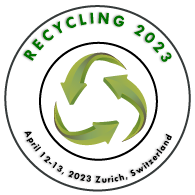Bioremediation
By promoting the growth of bacteria that consume pollutants like oil, solvents, and pesticides for food and energy, bioremediation cleans up contaminated sites. These bacteria transform pollutants and harmless gases like carbon dioxide into minute amounts of water.
For bioremediation to occur, the appropriate temperature, nutrition, and foods must be present. The removal of contaminants could take longer if certain components are absent. By introducing "amendments" to the environment, such as molasses, vegetable oil, or just plain air, unfavourable circumstances for bioremediation can be addressed. These modifications make it easier for bacteria to flourish, hastening the bioremediation process.
It is possible to perform bioremediation "in situ," or at the pollution site, or "ex situ," or elsewhere.
Related Conference of Bioremediation
Bioremediation Conference Speakers
Recommended Sessions
- Bioremediation
- Challenges in Plastic Waste Collection and Segregation
- Cylindrical Plastic for Packaging
- E-Waste
- Electric Vehicle (Ev) Batteries Circular Economy
- Innovation & Technology in Plastics Recycling
- Management and Recycling of Waste
- Physical & Chemical advanced Recycling
- Plastics Recycling Opportunities and Challenges
- Recovery of Thermal Waste
- Recycling Chemical Waste
- Recycling Industrial
- Recycling of Food and Agricultural Waste
- Recycling of Metal
- Recycling of Paper
- Solid Waste Management
- Start-up Showcase,
- The Bio-Electrochemical Treatment System is on
- The Bioplastics
- Treatment of Waste Water

